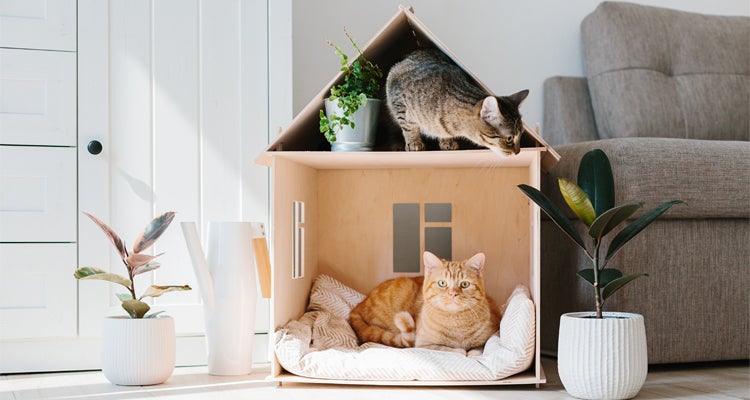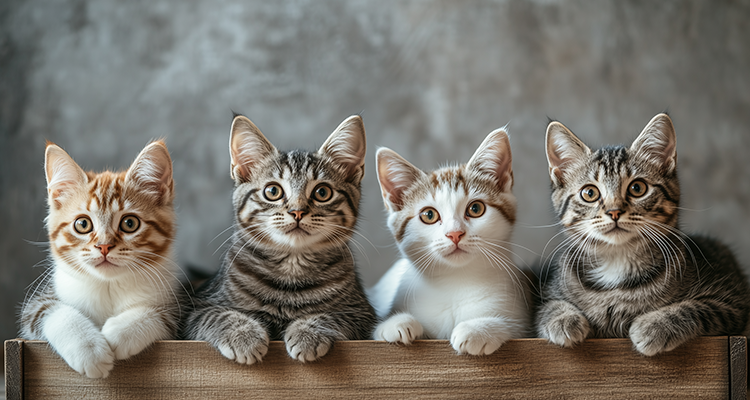
Table of Contents
- Does purring mean your cat is happy?
- Why is your cat purring?
- A Sign of Happiness
- Requesting Food
- Communication Between Kittens and Mothers
- Coping With Pain or Stress
- Healing Mechanism
- Purring When Nervous or Uncertain
- Self-Soothing in Various Situations
- Conclusion
- FAQs
Purring is the most common sound that cats make – and while cats purr when they're content, you shouldn't always assume that it means they’re in a good mood.
We look at the soft, continuous, vibrating sounds of purring to interpret what our feline companions may be feeling.
Does purring mean your cat is happy?
In most cases, cats will purr when they are in a relaxed environment, sending out waves of calmness. This may also occur when you stroke them, and if this is the case, your feline friend is feeling happy or sociable.
However, cats purr to communicate other emotions and needs, too. For instance, if you pick your cat up, they will either purr because they like it, or because they are nervous.
Why is your cat purring?
While you’ll never know exactly what your furry friend is trying to tell you with a purr, you can make an informed guess by considering the situation. Let’s break down the most common reasons why cats purr - and what your feline friend might be trying to tell you.
Reasons why your cat may be purring include:
1. A Sign of Happiness
Generally speaking, a cat purrs when it is in a calm and safe setting. Your cat's purring probably indicates a joyful, contented mood if their eyes are half closed, their tail is motionless, and their body posture is relaxed.
Purring frequently occurs when you pet or gently stroke your cat, especially if they trust you. Both cats and humans find this bond to be soothing.
2. Requesting Food
It's not always about contentment when purring. Additionally, cats may purr when they are hungry, especially prior to mealtime. This kind of purr is frequently combined with a high-pitched 'mew,' producing a distinctive sound that draws your attention.
This solicitation purr, which mimics the pitch of a crying baby to elicit a response, is thought by some experts to be a technique cats have learnt to use to manipulate their humans.
3. Communication Between Kittens and Mothers
Within a few days of birth, kittens start purring. They communicate their safety and well-being to their mother through purring, which strengthens their bond. Mother cats, on the other hand, purr to soothe and lead their kittens, particularly during nursing.
4. Coping With Pain or Stress
Unexpectedly, a lot of cats purr when they're stressed or in pain. Your cat may use purring as a self-soothing mechanism if they have been hurt, had surgery, or are in pain.
Similar to a child sucking their thumb, it gives them a sense of stability during upsetting situations.
5. Healing Mechanism
Purring may be an innate healing mechanism, according to some research. The low-frequency vibrations that purring produces, which range from 25 to 150 Hz, may encourage:
Bone regeneration
Wound healing
Pain relief
Better breathing
Reduced inflammation
Purring may be a natural way for cats to aid in their bodies' quicker recovery. This may also help to explain why cats frequently recover from injuries or surgeries better than dogs.
6. Purring When Nervous or Uncertain
Have you ever heard your cat purr when you picked them up but weren't sure if they enjoyed it? This is because cats don't only purr when they're happy; they can also do so when they're anxious or unsure.
Here, purring is employed to convey comfort or to cover up uneasiness, particularly in strange settings.
7. Self-Soothing in Various Situations
Sometimes purring is just a way to control emotions and isn't meant to be directed at anyone. Cats may purr to relax during a visit to the veterinarian, following a stressful situation, or while they are recuperating from an illness.
This behaviour, which is a remarkable illustration of how cats adjust to life's ups and downs, is a combination of instinct and emotional intelligence.
Conclusion
One of the most adaptable and enigmatic sounds in the feline world is purring, which can be used as a joyful greeting or as a pain-relieving reaction.
Think about the situation the next time your cat cuddles up and purrs next to you. Knowing why your cat purrs strengthens your relationship with them and makes you a more aware and loving pet owner.
FAQ
1 What does it mean when a cat purrs?
Cats use purring as a way to express a range of emotions. Although purring is frequently connected to relaxation and contentment, cats can also do it in response to discomfort, anxiety, or pain.
2 Why do some cats purr loudly while others purr softly?
Depending on a cat's personality and habits, their purr volume can change. The intensity and volume of a cat's purring can vary depending on a number of factors, including breed, age, and emotional state.
3 Is purring a sign of illness in cats?
When purring is accompanied by other symptoms like lethargy, appetite loss, or behavioural changes, it can occasionally be a sign of distress or illness. Keeping an eye on your cat's general behaviour is crucial.
4 Can cats purr while they are breathing?
Yes, It is true that cats can purr while they breathe because they can control their vocal cords to make the sound when they inhale and exhale. This contributes to the distinctive rhythm of purring.
5 Why does my cat purr when I pet them?
Your cat is likely relaxed and enjoying the attention. Purring during petting is a sign of trust and contentment.
6 Can cats purr when they’re scared or in pain?
Yes, cats can use purring as a coping strategy to help them relax when they're nervous or ill.
7 Does purring help cats heal?
Research suggests that low-frequency purring can stimulate healing processes such as bone growth and pain relief.
8 Do kittens purr too?
Within days of birth, kittens begin purring. The kitten and mother use it as a comforting and communication tool to strengthen their bond.
9 How do cats produce a purring sound?
Cats use their laryngeal muscles to make a purring sound. As air enters and exits the body during breathing, these muscles quickly contract and relax, producing a distinctive sound.
10 Do all cats purr?
While not all wild cat species purr, the majority of domestic cats do. Domestic cats purr, but lions and tigers, which are large cats, do not.













